Theater
Provocative puppets
Woolly show cleverly explores death
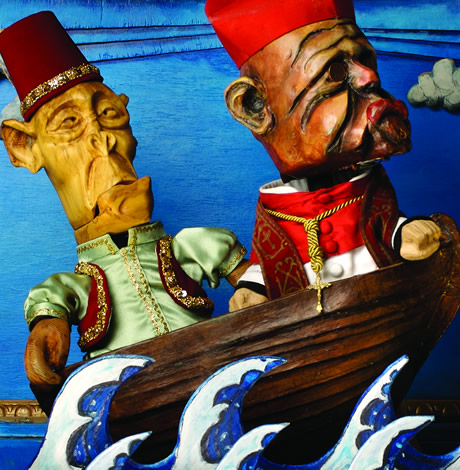
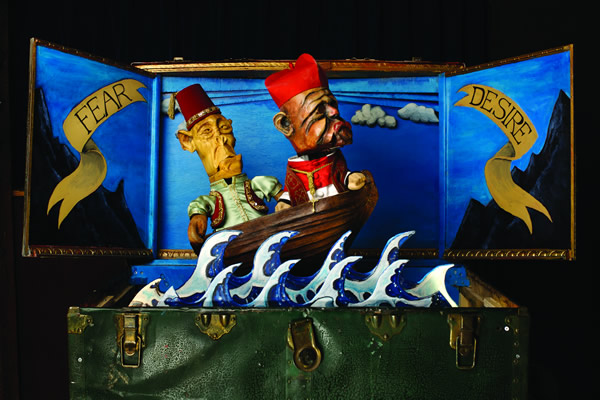
‘Famous Puppet Death Scenes’ is cleverly staged with a wide array of beautifully crafted puppets. (Photo by Jason Stang Photography; courtesy Woolly Mammoth)
‘Famous Puppet Death Scenes’
Through Jan. 4
641 D Street, N.W.
202-393-3939
Nothing like 80 minutes of charmingly told stories that all end in death (by accident, suicide or murder) to keep you in the holiday mood.
But in the case of “Famous Puppet Death Scenes” (now at Woolly Mammoth) it especially works. Funny, poignant and visually pleasing, this cleverly rendered puppet show for grownups compellingly addresses life’s big mystery — not love, but the eternal dirt nap — in a way that’s not the least bit depressing.
Created and performed by the Old Trout Puppet Workshop, Death Scenes’ 22, quaintly titled brief vignettes unfold without a glitch. Highlights include “The Ballad of Edward Grue” which recounts in several minutes the demise of an eccentric young man (played by a gorgeously made, antlered puppet) who enjoys traversing the forest disguised as a deer. That is until a hunter takes him down with a single bullet.
Then there’s “The Swede of DoneyLargen” that riffs on Sweden’s high suicide rate. “The Cruel Sea” continues the Scandinavian melancholy refrain with a man’s isolation and deadly dark winter at the shore. And “The Last Whale” says it all with an enormous, lone blinking eye that slowly closes — forever.
Costumed as vintage undertakers, the bearded puppeteers (Nick Di Gaetano, Viktor Lukawski and Pityu Kenderes) are sometimes seen expertly manipulating the workshop’s exquisitely made puppets. Occasionally they come out from behind the deco puppet theater and play parts in the scenes, amusingly expressing the frustration and resignation associated with the meeting of one’s maker.
The show’s host is Nathaniel Tweak, a wild-haired old puppet who shares his philosophy on death and the great beyond in the most calm and reflective ways. In his final scene, the desiccated Tweak is gently carried off by a rather frighteningly countenanced but caring grim reaper. It’s sweet and affecting.
But humor is the thread line of this piece. In recurring themed scenes titled “The Feverish Heart,” an amusing puppet best described as a squat Spaniard repeatedly does his darnedest to outwit death — here personified as an outsized fist — but never succeeds. The show’s message remains unchanged: Despite our best efforts, death always wins in the end.
Originally staged by Tim Sutherland, “Death Scenes” oh-so cleverly brings Muppets, puppets, Fisher Price-ish barnyard-themed figurines and other objects to life in the most believable ways. A humongous storybook opens to reveal a painting of an idyllic home that isn’t what it seems. There are shades of illustrator Edward Gorey’s dryly macabre sensibility and a bit of the creativity and whimsy of New York-based puppet auteur Basil Twist, who enjoyed a retrospective in Washington several seasons back. But this puppet show is entirely its own creation.
Founded in 1999, the Old Trout Puppet Workshop is based in Calgary, Canada. Its mission is to make puppet theater that is appealing to both children and adults. “Death Scenes” was initially inspired by the workshop’s 2004 production of “Pinocchio” in which the title character killed Jiminy Cricket with a hammer. The reaction to the death scene was so strong, that workshop members were prompted to produce a show entirely focused on puppet deaths scenes.
“Death Scenes” is entertaining and fast-paced, as fleeting as life itself. Its onslaught of untimely demises may inure you to death or at least quell the anxiety surrounding the final exit. At least enough to let you enjoy a puppet show.
Theater
Studio’s ‘Mother Play’ draws from lesbian playwright’s past
A poignant memory piece laced with sadness and wry laughs
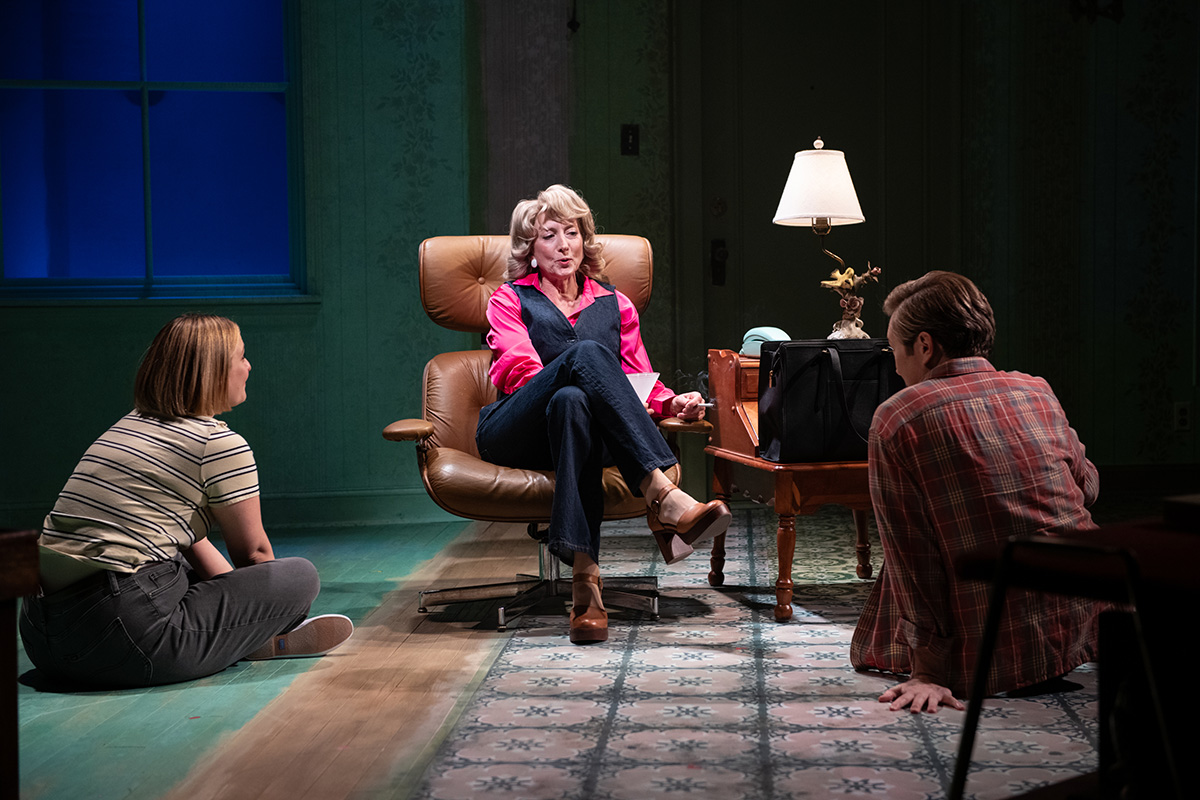
‘The Mother Play’
Through Jan. 4
Studio Theatre
1501 14th St., N.W.
$42 – $112
Studiotheatre.org
“The Mother Play” isn’t the first work by Pulitzer Prize-winning lesbian playwright Paula Vogel that draws from her past. It’s just the most recent.
Currently enjoying an extended run at Studio Theatre, “The Mother Play,” (also known as “The Mother Play: A Play in Five Evictions,” or more simply, “Mother Play”) is a 90-minute powerful and poignant memory piece laced with sadness and wry laughs.
The mother in question is Phyllis Herman (played exquisitely by Kate Eastwood Norris), a divorced government secretary bringing up two children under difficult circumstances. When we meet them it’s 1964 and the family is living in a depressing subterranean apartment adjacent to the building’s trash room.
Phyllis isn’t exactly cut out for single motherhood; an alcoholic chain-smoker with two gay offspring, Carl and Martha, both in their early teens, she seems beyond her depth.
In spite (or because of) the challenges, things are never dull in the Herman home. Phyllis is warring with landlords, drinking, or involved in some other domestic intrigue. At the same time, Carl is glued to books by authors like Jane Austen, and queer novelist Lytton Strachey, while Martha is charged with topping off mother’s drinks, not a mean feat.
Despite having an emotionally and physically withholding parent, adolescent Martha is finding her way. Fortunately, she has nurturing older brother Carl (the excellent Stanley Bahorek) who introduces her to queer classics like “The Well of Loneliness” by Radclyffe Hall, and encourages Martha to pursue lofty learning goals.
Zoe Mann’s Martha is just how you might imagine the young Vogel – bright, searching, and a tad awkward.
As the play moves through the decades, Martha becomes an increasingly confident young lesbian before sliding comfortably into early middle age. Over time, her attitude toward her mother becomes more sympathetic. It’s a convincing and pleasing performance.
Phyllis is big on appearances, mainly her own. She has good taste and a sharp eye for thrift store and Goodwill finds including Chanel or a Von Furstenberg wrap dress (which looks smashing on Eastwood Norris, by the way), crowned with the blonde wig of the moment.
Time and place figure heavily into Vogel’s play. The setting is specific: “A series of apartments in Prince George’s and Montgomery County from 1964 to the 21st century, from subbasement custodial units that would now be Section 8 housing to 3-bedroom units.”
Krit Robinson’s cunning set allows for quick costume and prop changes as decades seamlessly move from one to the next. And if by magic, projection designer Shawn Boyle periodically covers the walls with scurrying roaches, a persistent problem for these renters.
Margot Bordelon directs with sensitivity and nuance. Her take on Vogel’s tragicomedy hits all the marks.
Near the play’s end, there’s a scene sometimes referred to as “The Phyllis Ballet.” Here, mother sits onstage silently in front of her dressing table mirror. She is removed of artifice and oozes a mixture of vulnerability but not without some strength. It’s longish for a wordless scene, but Bordelon has paced it perfectly.
When Martha arranges a night of family fun with mom and now out and proud brother at Lost and Found (the legendary D.C. gay disco), the plan backfires spectacularly. Not long after, Phyllis’ desire for outside approval resurfaces tenfold, evidenced by extreme discomfort when Carl, her favorite child, becomes visibly ill with HIV/AIDS symptoms.
Other semi-autobiographical plays from the DMV native’s oeuvre include “The Baltimore Waltz,” a darkly funny, yet moving piece written in memory of her brother (Carl Vogel), who died of AIDS in 1988. The playwright additionally wrote “How I Learned to Drive,” an acclaimed play heavily inspired by her own experiences with sexual abuse as a teenager.
“The Mother Play” made its debut on Broadway in 2024, featuring Jessica Lange in the eponymous role, earning her a Tony Award nomination.
Like other real-life matriarch inspired characters (Mary Tyrone, Amanda Wingfield, Violet Weston to name a few) Phyllis Herman seems poised to join that pantheon of complicated, women.
Theater
D.C. theater scene has something for everyone this holiday season
‘Nutcracker,’ ‘A Christmas Carol,’ and much more
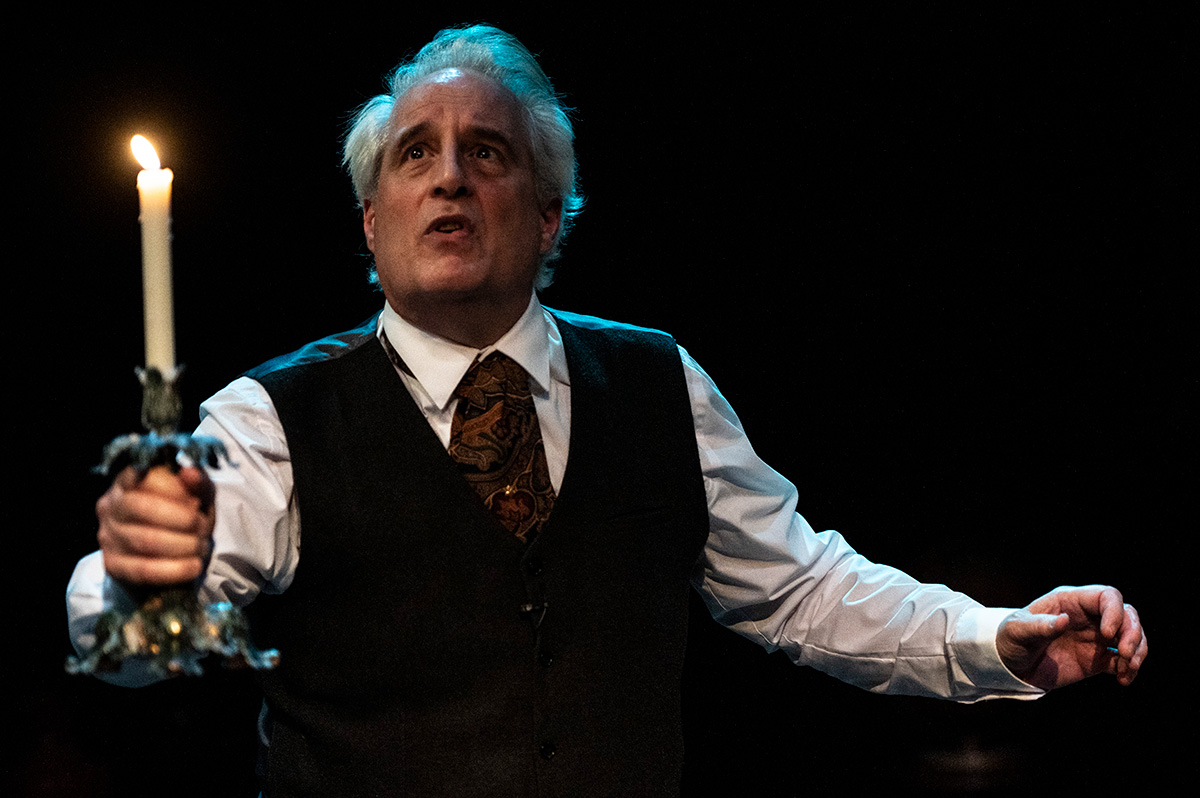
With its familiar music, yuletide imagery, and storytelling, theater can be a big part of the holidays. Add to that making memories and theater tickets wrapped as presents under the tree, and it’s a seasonal no brainer.
Folger Theatre presents “Resplendent Joy: Christmas Traditions from Spain and Portugal” (Dec. 5-14); the marvelous Folger Consort will perform early Spanish Christmas carols and traditional holiday music from early modern Spain and Portugal: folger.edu/resplendent
At Round House Theatre, playwright Sam Holcroft’s “Rules for Living” (Dec. 3-Jan. 4) makes its U.S. premiere. The darkly funny holiday comedy was a hit in London and is now hoping to repeat that success with a version tailored for the states. The seven-person cast includes versatile actors Naomi Jacobson and real-life spouse John Lescault. Ryan Rillette directs. roundhousetheatre.org
Theatre J presents “Chanukah in the Dark” (Dec. 6-21), an hour-long play ideal for ages five and up. “When the lights go out during Chanukah, Max and family begin sharing songs, stories, and traditions — only to discover the lights they needed and the miracles they searched for were in their midst all along.” edcjcc.org
The Cathedral Choral Society’s “Joy of Christmas” (Dec. 13-14) presents a wonderful program of carols and beloved holiday favorites at the festively decorated National Cathedral. The program features Seraph Brass, organist Edward Hewes, Carillonneur Edward M. Nassor, percussionist Mary La Blanc of “The President’s Own” U.S. Marine Band, and the Eastern Concert Choir from Eastern Senior High School. Cathedralchoralsociety.org
With “The Holiday Show,” (Dec. 13, 14, and 20), the Gay Men’s Chorus returns to entertain audiences with its annual and most popular show.
This year the holiday extravaganza is bigger than ever at historic Lincoln Theatre with new, soulful arrangements of favorite holiday carols: “The reindeer will be high-kicking and the snowflakes will sparkle. Songs include “O Holy Night,” “Rudolph the Red Nosed Reindeer,” “Let It Snow,” “We Wish You the Merriest,” and “Go Tell It on the Mountain.’” gmcw.org
At Olney’s intimate Mulitz-Gudelsky Theatre Lab, out actor Michael Russotto is back for the holiday season in his solo show “Christmas Carol: A Ghost Story of Christmas” (through Dec. 28). The talented Russotto portrays nearly 50 different characters from the Charles Dickens classic, that proves “funnier and far more relevant than you might imagine.” Olneytheatre.org
Also on holiday offer in the DMV are a jolly bunch of musical chestnuts as well as reliable Christmas crowd-pleasers.
Included on the roster is Olney Theatre’s production of Jerry Herman’s “Hello, Dolly!” (through Jan. 4) starring the mega-talented Nova Y. Payton. Based on the play “The Matchmaker” by famed gay playwright Thornton Wilder, the musical has proved a vehicle for many a diva including Carol Channing, Pearl Bailey, Bette Midler, and Barbra Streisand. Now Payton dons the mantle and the buzz is good.
Another beloved musical is “Fiddler on the Roof” (through Jan. 25), the story of Tevye, a poor Jewish milkman, his family and their tight-knit community who honor tradition while contending with pogroms in Czarist Russia. Currently being performed intimately in the round at Signature Theatre in Arlington and directed by Joe Calarco, the large cast features actors Douglas Sills, Chrisopher Bloch, and terrific out actor Jake Loewenthal as the poor tailor Motel Kamzoil, all singing Broadway favorites like “Sunrise, Sunset” “If I Were a Rich Man” and “Matchmaker.” sigtheatre.org
At Shakespeare Theatre Company’s Harman Hall is Frank Loesser’s “Guys and Dolls” (through Jan. 4). Based on tales from famed American journalist Damon Runyon, the show focuses on two overlapping love stories set in Depression-era Times Square. The terrific score includes songs like “Luck Be a Lady,” “Sit Down, You’re Rockin’ the Boat,” “A Bushel and a Peck,” and more songs you’ll know. Directed by Francesca Zambello and choreographed by Joshua Bergasse.
The cast includes Julie Benko, Lamont Brown, and Holly Twyford as General Matilda B. Cartwright, which is reason enough to buy a ticket. shakespearetheatre.org
And for hardcore traditionalists there’s the Washington Ballet’s “The Nutcracker” (through Dec. 29) with its balletic magic at the charming gilded Warner Theatre. The beloved production of Tchaikovsky’s ballet, here set in 1882 Georgetown, features a retinue of agile partiers, children, soldiers, rats, and notable figures from American history. washingtonballet.org
And last but hardly least, historic Ford’s Theatre presents “A Christmas Carol” (through Dec. 31), an enduring Washington tradition since I was youngish. Conceived by Michael Baron, this charming Dickens’ moneymaker again spotlights Craig Wallace as miserly Ebenezer Scrooge who after a night of ghostly visits, rediscovers Christmas joy. Fords.org
Theater
New take on ‘Some Like It Hot’ offers diverse casting
National Theatre production includes non-binary character
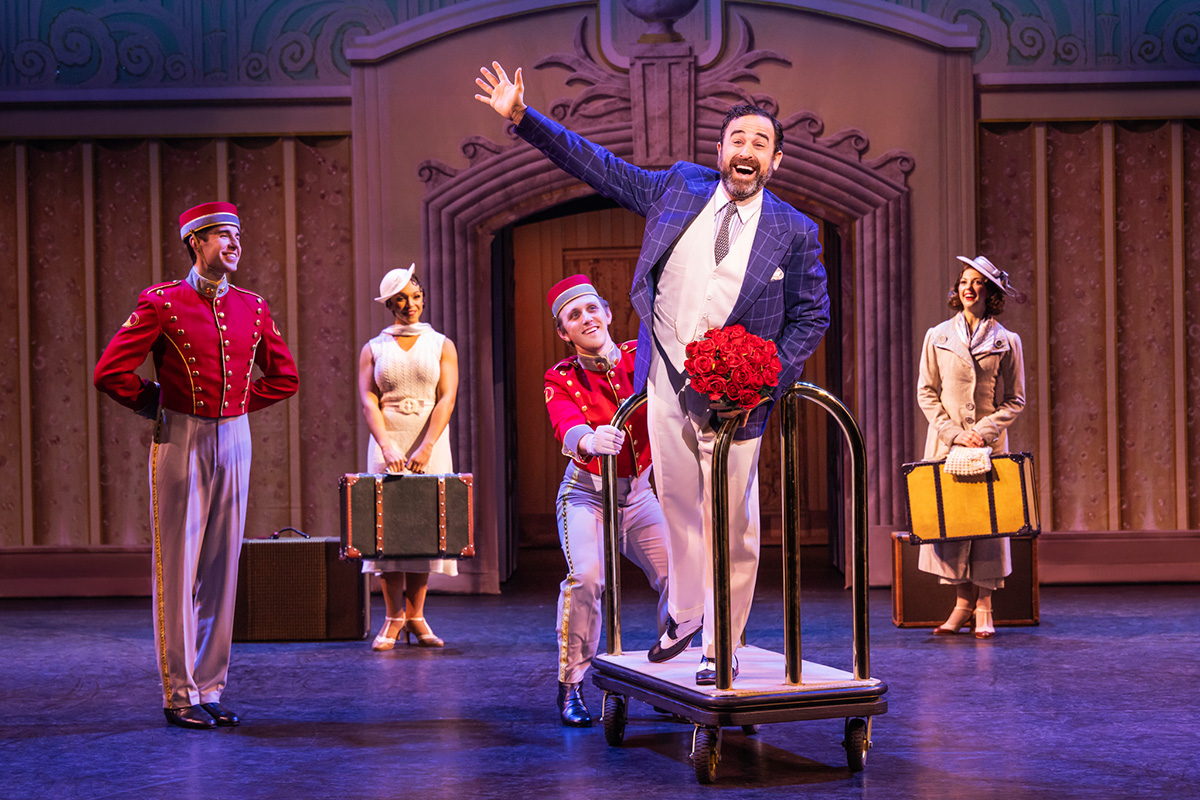
‘Some Like It Hot’
Nov. 25 – Dec. 7
The National Theatre
1321 Pennsylvania Ave., N.W.
Tickets starting at $67
Broadwayatthenational.com
For more than a year, out actor Edward Juvier has been part of the national tour of “Some Like It Hot,” the musical adaption of the 1959 classic comedy starring Marilyn Monroe and written and directed by Billy Wilder.
Juvier, 49, plays Osgood Fielding III, a cheery millionaire in Depression-era America.
With music by Marc Shaiman, lyrics by Scott Wittman and Shaiman, and a book by Matthew López and Amber Ruffin, the 2022 musical is quite different as well with diverse casting, increasingly complicated backstories, and a non-binary character (Daphne).
A talented tenor and Houston native, Juvier is a Cuban American who’s been working in musical theater since graduating from the Boston Conservatory in 2000.
“I personally love touring,” says Juvier. “I like the life on the road and visiting these old theater houses across the country. Seeing the locals that I remember and my friends and family that live all over. For me, a transient life is great. Maybe not so great for others.”
Early in his career, he toured with “Phantom of the Opera” for six years. He began in the ensemble and covered two principal roles, and moved to swing which gave him the longevity covering 11 different roles in that show, a life-changing gig that he remembers fondly.
WASHINGTON BLADE: As a gay actor touring in a hot musical with some queer themes do you feel that you make an impact?
EDWARD JUVIER: Oh yeah, it’s important for queer people to see representation on stage. Our version of the show is a sneak attack; it doesn’t hit you over the head with themes. Seeing an old story that takes a turn where you’re left to accept what’s happening onstage and by that time, you’re in love and rooting with the characters. You feel it from the audiences and we play some of the reddest of states.
Queer, trans, nonbinary people meet us at the stage door in tears thanking us for the representation. They didn’t even know when they came to the show that they’re going to see something with such an affirming message to their lives, and they’re thrilled when they find that out.
BLADE: How were you drawn into musical theater?
JUVIER: I was lucky that my Texas high school made annual trips to New York to see Broadway shows. On one trip, I remember seeing “Will Rogers Follies,” I felt like Keith Carradine was looking and talking right to me.
And the next day, we saw “Falsettos,” the original production. After seeing those two very different shows it was as if I blasted off into the Broadway world.
BLADE: Did “Falsettos,” a musical about AIDS, resonate with you as young gay student?
JUVIER: Absolutely. It shook me to the core.
BLADE: Has being gay made you a better actor?
JUVIER: I think what makes a great actor is somebody who has enormous empathy, able to put themselves in someone else’s shoes, and what better than a queer artist to be able to empathize.
I came out pre- “Will and Grace.” A different time to be coming out than it is now, which shows immense progress but also put us through challenges. It’s been a part of my journey.
I’m lucky to have the best, most supportive family. No Trumpers to deal with when I go home for the holidays. So, I’m grateful for that especially at this time of year.
BLADE: How do you approach a comic character like Osgood.
JUVIER: I approach him with honesty and simplicity and try to get out of the way of cheap jokes.
When I’m feeling that I’m pushing myself I remind myself to just say the words. I think the musical is so beautifully crafted in a way to brings the show to a new audience. Changes aren’t a diss on the original but the world has changed.
BLADE: Are you a big fan of the original?
JUIVIER: I respect the original. It’s been with me all my life especially being a queer artist. We grew up watching “Some Like It Hot.” This takes old themes and jokes that don’t land so well and brings it to a new audience.
Particularly with my role played originally and so brilliantly by famed comedian Joe E. Brown. In the movie he’s not a multi-dimensional character. He’s more of an old, rich pervy guy. That’s just how it was back then. And I’ve had the great privilege to play him differently.




















